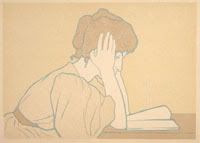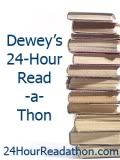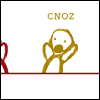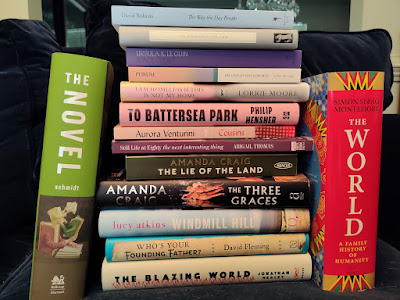
I'm blatantly ripping off
LitLove in the way I answer the questions in
today's meme, so make sure you read her brilliant responses from last week. For those of you following Mr. Linky from the BBAW blog who are new to pages turned, I'm the blogger who prefers commonplacing to writing my own content any day of the week.
Do you snack while you read? If so, favorite reading snack?
To avoid wasting a precious half-hour, I used to take bread and chocolate with me and ate them openly at midday in the reading-room. Around me other readers, shame-faced and short of money, were also eating bread, but breaking off the pieces in their pockets. Twelve noon was the signal for a vast chorus of munching.
--Henry de Montherlant
Do you tend to mark your books as you read, or does the idea of writing in books horrify you? [Your books] take on something of your personality, and your environment also--you know a second-hand book sometimes is so much more flesh and blood than a new one--and it is almost terrible to think that your ideas, yourself in your books, may be giving life to generations of readers after you are forgotten.
--T.E. Lawrence
How do you keep your place while reading a book? Bookmark? Dog-ears? Laying the book flat open?Personally, as long as the book in question belongs to me, I have little restraint about dog-earing corners.
--Mikita Brottman
Fiction, Non-fiction, or both? "I
read," I say. "I study and read. I bet I've read everything you've read. Don't think I haven't. I consume libraries. I wear out spines and ROM-drives. I do things like get in a taxi and say, 'The library, and step on it.' "
--David Foster Wallace
Hard copy or audiobooks?
The sight of the cover of a book one has previously read retains, woven into the letters of its title, the moonbeams of a far-off summer night.
--Marcel Proust
Are you a person who tends to read to the end of chapters, or are you able to put a book down at any point? One reads at one's own speed, in short snatches on the subway or in long, voluptuous withdrawals from the world. One proceeds through a big, complex novel. . . .like an exceptionally well-heeled tourist in a foreign landscape, going slowly or fast depending on the roads, on one's own mood and on the attractions along the way. If one loses something, one can always go back to pick it up.
--Vincent Canby
If you come across an unfamiliar word, do you stop to look it up right away?
All my life I've looked at words as thought I were seeing them for the first time.
--Ernest Hemingway
What are you currently reading?The organized soul has one book beside his bed. The glutton sleeps with a New York skyline lurching an inch from the bed.
--Charlotte Gray
What is the last book you bought?If a book is worth reading, it is worth buying. No book is worth anything which is not worth
much; not is it serviceable until it has been read, and re-read, and loved, and loved again; and marked, so that you can refer to the passages you want in it, as a soldier can seize the weapon he needs in an armory; or a housewife bring the spice she needs from her store.
--John Ruskin
Are you the type of person that only reads one book at a time or can you read more than one at a time? Usually I read several books at a time--old books, new books, fiction, nonfiction, verse, anything--and when the bedside heap of a dozen volumes or so has dwindled to two or three, which generally happens by the end of one week, I accumulate another pile.
--Vladimir Nabokov
Do you have a favorite time of day and/or place to read?Early morning was a time he enjoyed reading. His mind was alert, the attention span seemed to continue indefinitely, right until he remembered about having to go to school. It was a nice time, a peaceful time. There was something about giving your best to the things you liked the best.
--James Kelman
Do you prefer series books or stand alone books?
A sequel is an admission that you've been reduced to imitating yourself.
--Don Marquis
Is there a specific book or author that you find yourself recommending over and over?People seldom read a book which is given to them.
--Samuel Johnson
How do you organize your books? (By genre, title, author’s last name, etc.?)
Your house, being the place in which you read, can tell us the position books occupy in your life, if they are a defense you set up to keep the outside world at a distance, if they are a dream into which you sink as into a drug, or bridges you cast toward the outside, toward the world that interests you so much that you want to multiply and extend its dimensions through books.
--Italo Calvino

































